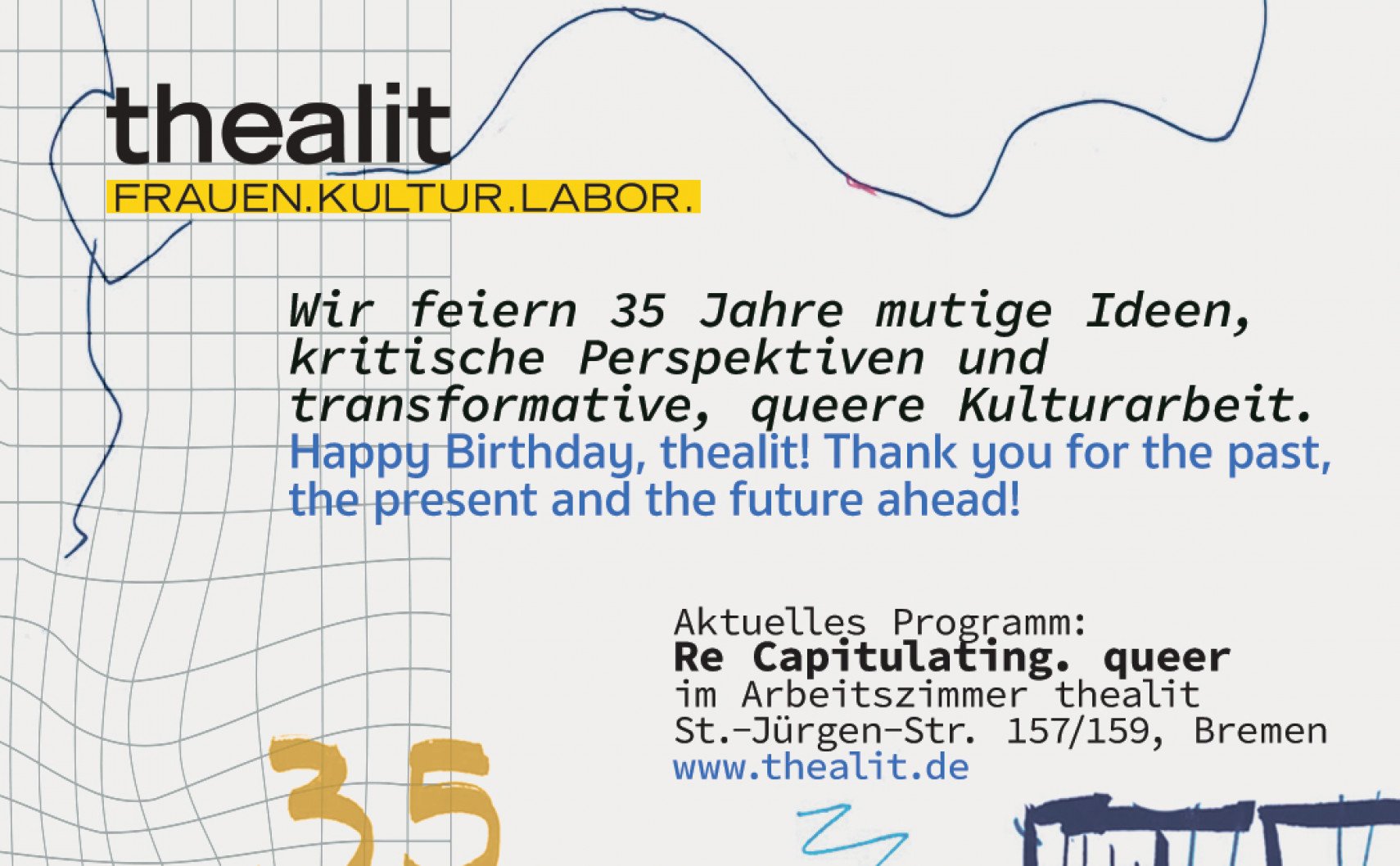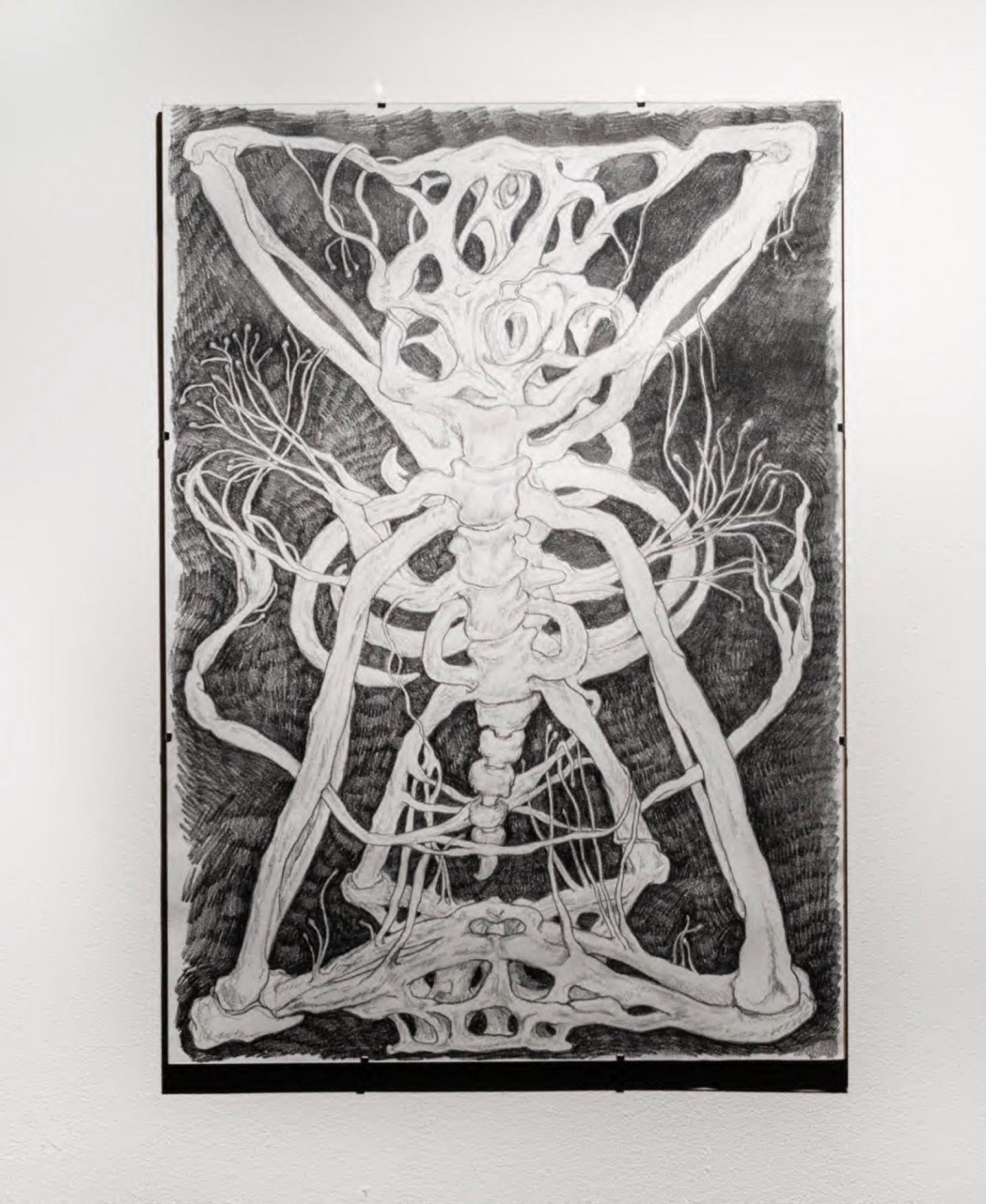Aktuelles

We celebrate 35 years of bold ideas, critical perspectives, and transformative queer cultural work.
Happy Birthday, thealit! Thank you for the past, for the present and for the future ahead!
- August 29, 2025- March 15, 2026
- ART RESIDENCIES & INTERMISSIONS
- Re Capitulating. queer II
- at Arbeitszimmer thealit
- St. Jürgen Str. 157/159, Bremen
Artists & projects 2025/2026
- ACTINOMY (Residency 29.08.-14.09.2025), HELENA OTTO (Residency 16.09.-01.10.2025), SULME & JAE-NDER FLUID (Intermission 02.-08.10.),STEPH HANNA (Intermission 09.-12.10.), MARI LENA RAPPRICH (Residency 16.-26.10.), *ANJA SCHNAARS (Residency 28.10.-08.11.), BARBARA DÉVÉNY (Residency 10.-23.11.2025), CAMILA FLORES-FERNÁNDEZ (Residency 24.-30.11.2025), HANK D. WÜSTENBERG (Intermission 02.-09.12.), SIMONE KARL & ANNE PRETZSCH (Intermission 11.-14.12.), SUSE ITZEL (Residency 15.12.2025-06.01.2026), THE HOLOGRAM (Intermission 08.-11.01.2026), WORKING GROUP ON ENDINGS (Intermission 14.-18.01.2026), S4RA (Intermission 19.-23.01.), SARAH LÜDEMANN (BEAUHAM) (Residency 24.01.-07.02.2026), JENNIFER YUE YUEN YU (Residency 09.-22.02.2026), BOKEUM LEE & PYUNGHWA LEE (Residency 01.-06.03.), YUYEN LIN-WOYWOD (Residency 07.-13.03.2026)
- Web: Re Capitulating. queer
NOW AT ARBEITSZIMMER THEALIT
- SARAH LÜDEMANN (BEAUHAM)
- Residency 24.01.-07.02.2026
During her residency, Sarah Lüdemann (Beauham) will use her time to explore an (artistic) research question, which she formulates as follows: “During my residency at thealit, I will explore the term ‘queer’ as a form of constant transformation, applying it to the concept of category itself. Within this process, textual modules will be created that are not only to be read, but also made spatially perceptible.” A quote from a lecture by Gertrude Stein, Composition as Explanation, 1926, precedes a project outline, similar to a motto.
“Beginning again and again is a natural thing even when there is a series. Beginning again and again and again explaining composition and time is a natural thing. It is understood by this time that everything is the same except composition and time, composition and the time of the composition and the time in the composition. Everything is the same except composition and as the composition is different and always going to be different everything is not the same. Everything is not the same as the time when of the composition and the time in the composition is different. The composition is different, that is certain.”
Within her artistic work Sarah Lüdemann (Beauham) investigates into (human) system structures, bodies and chimeras. She abstracts her findings into elements and choreographies for multi-media sculptures and text.
- JENNIFER YUE YUEN YU
- Residency 09.-22.02.2026
- Wed February 18, 7:30 p.m.
- Performance
- Sat February 21, 1:00-5:00 p.m.
- Sun February 22, 1:00-5:00 p.m.
- Open Studio
Jennifer Yue Yuen Yu's residency is dedicated to the Siphonophore Paradox.
Siphonophore Paradox... What is that? First, ‘siphonophore’: "Siphonophores (Siphonophorae) are an order of colony-forming and free-swimming cnidarians of the class Hydrozoa, whose colonies consist of hundreds to thousands of polyps. The individual animals of the colony are so highly specialized and diverse that they can almost be considered organs of a single organism. There are feeding polyps, sensory polyps, defensive polyps, reproductive polyps, and cover polyps, as well as the upper swimming buoy and numerous swimming bells." (‘Wikipedia)
And could the paradox of these state-like interacting polyps have something to do with the so-called 'plankton paradox’? "In essence, the paradox is that species that compete for the same resource should not be able to coexist when resources are homogeneously mixed in the environment. In such a situation one species should always prevail, [it does under lab conditions] […] This conflicts with what is seen in the environment, where hundreds of plankton species coexist, even where competition is heavy." (Towards a resolution of ‘the paradox of the plankton’)
The work of Jennifer Yue Yuen Yu will certainly establish its own unique connections here. She formulates it in general terms in her announcement: The project explores “the blurred boundaries between individuality and collectivity within aquatic lifeforms. Through this entanglement of the human body and the siphonophore, her work opens speculative spaces for rethinking identity, kinship, and interdependence in watery worlds. Moving toward the concept of fossilizing living bodies—fluid beings caught in forces beyond their control—she traces how diasporic identities and ecological histories intertwine to shape embodied experience.
Building on previous drawing studies that explore the figuration of human-sea creature hybridity, this project will expand into a bodily performance using a custom-built sculpture that both fits, holds, and transforms my body. There may be a performance at the end of the residency to showcase the result or progress. The sculpture will act as an extension and distortion of my form—a prosthetic ecology. Inspired by the modular anatomy of the siphonophore, the work explores how bodies move through constraint and fluidity, not as singular entities but as distributed systems of relation.

By submitting my body to this structure, I aim to rearticulate forms of support, vulnerability, and adaptation in a queer futurity where bodies are never fully fixed, but always in becoming.”
- BOKEUM LEE & PYUNGHWA LEE
- wo war zuhause: Rekapitulationen zweier Schwestern
- Residency 01.-06.03.2026
- Fri, March 6 - 1:00-5:00 p.m.
- Open Studio
- YUYEN LIN-WOYWOD
- Residency 07.-13.03.2026
- Save the Dates!
- Thursday, March 12, 6:00–8:00 p.m.
- Friday, March 13
NOTE ON ACCESSIBILITY:
- The access to the Workroom Arbeitszimmer thealit (St.-Jürgen-Straße 157/159, Bremen) is not barrier-free. However, a ramp can be installed if necessary. Please ask for it in advance. Door width 85cm.
- Unfortunately, there is no wheelchair accessible toilet in the room.
- A parking space for people with disabilities is located about 200 metres away, at Strassburger Straße 72.
Always up to date
- Don't miss any more news:
- Subscribe to our NEWSLETTER or follow us on INSTAGRAM